

Understanding Giftedness. Who are the Gifted?
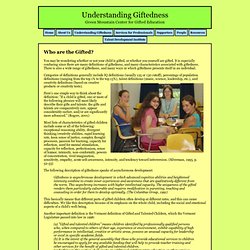
You may be wondering whether or not your child is gifted, or whether you yourself are gifted. It is especially confusing since there are many definitions of giftedness, and many characteristics associated with giftedness. There is also a wide range of giftedness, and many ways in which giftedness presents itself in an individual. Categories of definitions generally include IQ definitions (usually 125 or 130 cutoff), percentage of population definitions (ranging from the top 1% to the top 15%), talent definitions (music, science, leadership, etc. and creativity definitions (based on creative products or creativity tests).
Thinking like a genius: overview. Thinking and recall series Problem solving: creative solutions "Even if you're not a genius, you can use the same strategies as Aristotle and Einstein to harness the power of your creative mind and better manage your future.

" The following strategies encourage you to think productively, rather than reproductively, in order to arrive at solutions to problems. "These strategies are common to the thinking styles of creative geniuses in science, art, and industry throughout history. " Nine approaches to creative problem solving: Rethink! Exercise #2 illustrates how famous thinkers used these approaches. Intellectual Giftedness.
Intellectual giftedness, often referred to as high IQ, is usually given short shrift when it comes to considerations of the special needs of exceptional people.
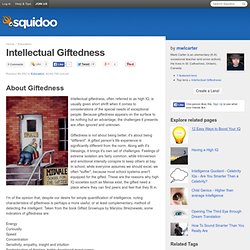
Because giftedness appears on the surface to be nothing but an advantage, the challenges it presents are often ignored and unknown. Giftedness is not about being better, it's about being *different*. A gifted person's life experience is significantly different from the norm. Along with it's blessings, it brings it's own set of challenges. Unlocking the Mysteries of The Artistic Mind. Consider the flightless fluffs of brown otherwise known as herring gull chicks.
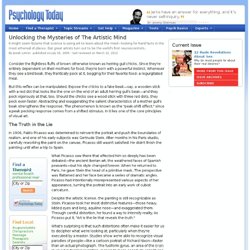
Since they're entirely dependent on their mothers for food, they're born with a powerful instinct. Whenever they see a bird beak, they frantically peck at it, begging for their favorite food: a regurgitated meal. But this reflex can be manipulated. Expose the chicks to a fake beak—say, a wooden stick with a red dot that looks like the one on the end of an adult herring gull's beak—and they peck vigorously at that, too. Should the chicks see a wood stick with three red dots, they peck even faster. Thinking like a genius: selected thoughts. Exquisite Minds: Gifted and Creative Children « Support for Educators and Parents of Gifted and Creative Children "The problems that exist in the world today cannot be solved by the level of thinking that cr.
The Nature Of Genius. Genius by L.
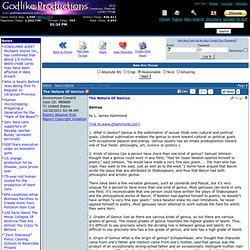
James Hammond [link to www.ljhammond.com] 1. What is Genius? 2. There have been a few versatile geniuses, such as Leonardo and Pascal, but it’s very unusual for a person to have more than one kind of genius. 3. 4. Many geniuses emerged from families that had been successful in practical affairs, and then had declined in vigor and strength. In Wittgenstein’s family, one finds the same combination of business success and mental instability; Wittgenstein’s father was a steel magnate, one of the richest men in Europe, but three of Wittgenstein’s brothers committed suicide. The best solution to the problem of the origin of genius is a solution that combines Schopenhauer’s theory with Abraham’s theory. While genius inherits certain virtues and talents, it usually bequeaths little. Nature and Needs of Gifted Learners. Profiles of the Gifted & Talented. Gender and Genius.
Kerr, B.
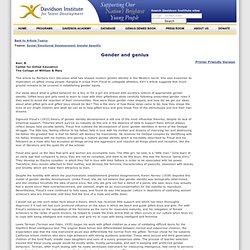
Center for Gifted Education The College of William & Mary This article by Barbara Kerr discusses what has shaped modern gender identity in the Western world. She also examines its implication on gifted young people. Ranging in scope from Freud to collegiate athletics, Kerr's article suggests that much ground remains to be covered in establishing gender equity. Our ideas about what is gifted behavior for a boy or for a girl are imbued with society's notions of appropriate gender identity. The intellectual and psychosocial nature of extreme giftedness. Powell, P.
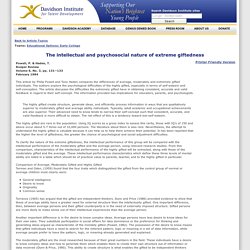
& Haden, T. Roeper Review Volume 6, No. 3, pp. 131--133 February 1984 This article by Philip Powell and Tony Haden compares the differences of average, moderately and extremely gifted individuals. The authors explore the psychological difficulties of the highly gifted, especially in terms of self-esteem and self-conception. The article discusses the difficulties the extremely gifted have in obtaining consistent, accurate and valid feedback in regard to their self-concept. The information provided has implications for educators, parents, and psychologists.
Creativity across the life-span: A systems view. Csikszentmihalyi, M.
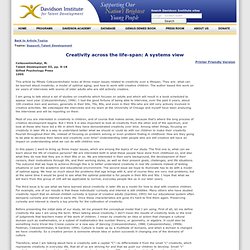
Talent Development III, pp. 9-18 Gifted Psychology Press 1995 This article by Mihaly Csikszentmihalyi looks at three major issues related to creativity over a lifespan. They are: what can be learned about creativity; a model of optimal aging; and how to work with creative children. The author based this work on six years of interviews with scores of older adults who are still actively creative. I am going to talk about a set of studies on creativity which focuses on adults and which will result in a book scheduled to appear next year (Csikszentmihalyi, 1996). Paternal Influence on Gifted Males. Hammond, D.R., Hébert, T.P., & Pagnani, A.R.
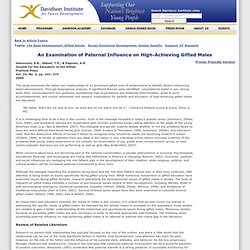
Journal for the Education of the Gifted Prufrock Press Vol. 33, No. 2, pp. 241–274 2009 This study examines the father-son relationships of 10 prominent gifted men of achievement to identify factors influencing talent development. Through biographical analysis, 6 significant themes were identified: unconditional belief in son, strong work ethic, encouragement and guidance, maintaining high expectations and fostering determination, pride in son’s accomplishments, and mutual admiration and respect. Fostering adult giftedness: Acknowledging and addressing affective needs of gifted adults. Fostering Adult Giftedness: Acknowledging and Addressing Affective Needs of Gifted Adults Recently I had the pleasure of participating in an Internet conference with parents in Australia about the social and emotional needs of gifted children.

During the two weeks of dialogue one parent, Michelle, said: My own experience (and I suspect that of many other parents of gifted children) is that my awareness of giftedness came about after becoming a parent. In the process of learning about how to respond to the child’s needs, we parents often find ourselves discovering many things about ourselves and perhaps even dealing with a few painful memories of our own childhood experiences. She went on to say: How to Charm Gifted Adults into Admitting Giftedness: Their Own and Somebody Else’s. The Loneliness of Being Misinformed about Giftedness In my current experience and view, the biggest “social issue of the gifted” is the painful misfit between implicit beliefs about giftedness by the non-gifted and the gifted alike and the actual or perceived reality of very many gifted adults. That misfit leads to utter loneliness: It impedes the sharing of one’s deep feelings and experiences related to giftedness with others because of the belief that these have nothing to do with being gifted.
It also leads to avoiding calling oneself gifted – even if the direct question is asked – because of strong inner convictions about not qualifying for that seemingly outstanding state of being. I feel this is strongly connected to the dominant belief that for adults their giftedness is defined by actual eminent achievement, with the tacit assumption that only something like a Nobel Prize will be sufficient proof of eminence. Discovering the gifted ex-child. Discovering the Gifted Ex-Child Abstract Most of the attention given to the gifted over the years has been devoted to gifted children, a population identified by unusual mental processing that sets them apart from the norms.
Gifted adults, however, are recognized in our society solely by their achievements.